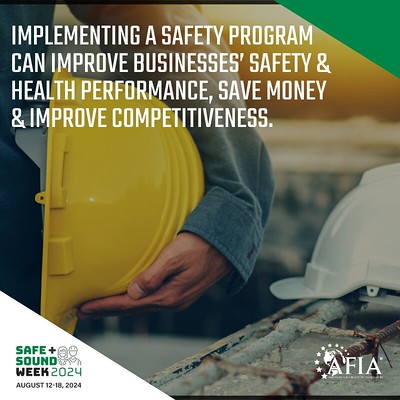Worker Safety is a Fundamental Aspect of Corporate Sustainability
Written by: Erica Burson | August 14, 2024
Earlier in my career, as a contractor, I attended a transportation company meeting. Agenda item one was to participate in a safety briefing, where we learned where the exits were, any hazards we could encounter and what to do in an emergency. This impressed upon me that this company’s culture prioritized safety for its customers and workers. 
Building a culture of safety, following safe workplace practices and integrating consistent review, training and improvement into regular operations is vital for keeping all workers safe. Implementing a safety program is an opportunity to involve workers at all levels, which can increase employee morale and retention and improve a company’s overall competitiveness.
The Occupational Safety and Health Administration has designated Aug. 12-18 as Safe + Sound Week. While the American Feed Industry Association (AFIA) offers workplace safety resources, including newsletters, discounts on safety signage, publications, graphics (like the one above) to members, the Institute for Feed Education and Research (IFEEDER) has explored worker safety as a component of the animal food industry’s sustainability efforts.
“Worker safety is a fundamental aspect of corporate sustainability, embodying a company's commitment to ethical practices, employee well-being and long-term operational viability. Ensuring a safe working environment is not only a moral obligation but also a strategic one, as it directly impacts employee health, productivity and morale. The indicator reflects the adherence to safety regulations and standards, investments in safer operations, as well as training and other efforts a company can focus on to support employee knowledge and awareness of their role in a safe workplace.”
- Quote from an animal food company included in the “Worker Safety” section of the IFEEDER Animal Food Industry Sustainability Toolkit
For long-time American Feed Industry Associaiton (AFIA) member AgState, an Iowa-based cooperative that produces animal feed, grain, fertilizer and fuel, worker safety started with identifying on-the-job risks, including driving in inclement weather, working with heavy machinery and other activities related to delivery and office operations. The company provides consistent training and focuses on eliminating potential hazards.
According to Scott Lovin, Ag State’s vice president of Feed, the company has devoted considerable resources to creating and maintaining a safe working environment, from upgrading catwalks to preventing slips and falls to sharing near-miss reports internally to help identify and remove risks that could affect others. The company reports the required safety data to OSHA and keeps internal metrics to identify areas for improvement.
"As an industry, we work just as hard to protect the health and safety of our employees as we do to manufacture safe foods for animals," said Gary Huddleston, AFIA's director of Feed Manufacturing and Regulatory Affairs, in an AFIA blog.
A safe workplace means fewer accidents, less interruptions to operations and improved employee morale and productivity. Emphasizing worker safety can foster a culture of continuous improvement and build trust with customers, investors and community members.
Sustainability is not about just a company’s carbon footprint. Sustainability can also include how companies value their employees, use resources (e.g., energy and water) and give back to local communities.
Check out IFEEDER’s “Materials Issues” resource in the sustainability toolkit for ways to consider sustainability in your organization and measure the good work you are already doing.